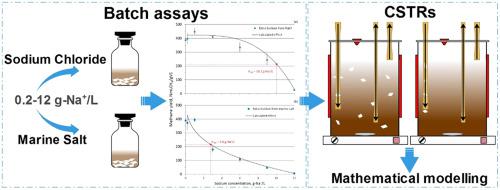Journal of Environmental Chemical Engineering ( IF 7.4 ) Pub Date : 2021-04-01 , DOI: 10.1016/j.jece.2021.105406 Panagiotis Tsapekos , Adam Kovalovszki , Merlin Alvarado-Morales , Amata Rudatis , Panagiotis G. Kougias , Irini Angelidaki

|
Anaerobic fermentation of various organic wastes to produce valuable intermediate products and generate a mixture of combustible gases has been researched actively in the past decades. For one, marine biomass as an abundant organic residue of water-locked countries has recently gained increasing popularity. However, such biomass is known to contain high levels of salt, which can be detrimental to the machinery and affects the microbial activity involved in the process. To evaluate the latter, a comprehensive study of sodium chloride and marine salt as potential inhibitors of the anaerobic digestion process is hereby presented. The hypothesis was tested in three major steps. In the first step, batch toxicity assays showed that marine salt is already inhibitory to the anaerobic digestion microbiome, at a half-maximal inhibitory concentration of 2.8 g-Na L-1, compared to synthetic sodium that was inhibitory only at a concentration of 10.1 g-Na L-1. Next, experiments with a continuous reactor showed that the gradual addition of salt to a reactor leads to irreversible inhibition, while a similar reactor that is also spiked with salt might be recoverable to some extent. Finally, a bioconversion model, which for the first time was extended with a dynamic salt inhibition module, produced simulations that agreed well with the results of the continuous experiments, suggesting the presence of agile methanogenic archaea that can temporarily buffer the negative effect of increasing salt concentrations. The findings of this work may provide inputs to future anaerobic fermentation experiments with salts and could benefit from detailed microbial analyses.
中文翻译:

高盐度条件下大藻生物量与牛粪的厌氧消化
在过去的几十年中,已经积极地研究了各种有机废物的厌氧发酵,以产生有价值的中间产物并生成可燃气体的混合物。首先,海洋生物质作为水禁国丰富的有机残留物,近来越来越受欢迎。然而,已知此类生物质包含高含量的盐,其可能对机械有害并且影响该过程中涉及的微生物活性。为了评估后者,现对氯化钠和海盐作为厌氧消化过程的潜在抑制剂进行全面研究。在三个主要步骤中检验了该假设。第一步,分批毒性试验表明,海盐已经对厌氧消化微生物组产生了抑制作用,其最大抑制浓度为2。-1,与仅在10.1 g-Na L -1浓度下具有抑制作用的合成钠相比。接下来,使用连续反应器进行的实验表明,向反应器中逐渐添加盐会导致不可逆的抑制作用,而同样掺有盐的类似反应器可能在某种程度上可以回收。最后,首次使用动态盐抑制模块进行扩展的生物转化模型产生的模拟结果与连续实验的结果非常吻合,表明存在敏捷的产甲烷古菌可以暂时缓解盐分增加的负面影响浓度。这项工作的发现可能会为将来的含盐厌氧发酵实验提供投入,并可能会从详细的微生物分析中受益。










































 京公网安备 11010802027423号
京公网安备 11010802027423号